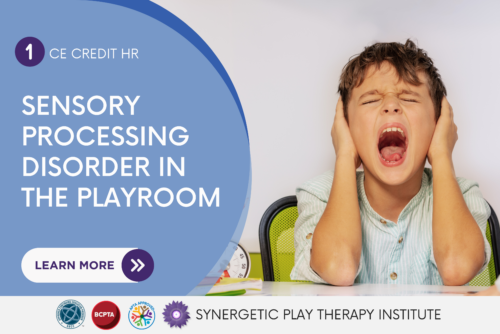-

 Eating challenges in children can show up in many ways. From the refusal to eat to eating too much, underneath often lies the need for perfectionism and control. Helping kids take these challenges off their plates involves offering choices and uncovering co-existing issues, as well as providing parental support. This course takes a look at this important struggle.
Eating challenges in children can show up in many ways. From the refusal to eat to eating too much, underneath often lies the need for perfectionism and control. Helping kids take these challenges off their plates involves offering choices and uncovering co-existing issues, as well as providing parental support. This course takes a look at this important struggle. Adverse Childhood Experiences (ACES) can be a part of growing up. But how can we help turn these obstacles into opportunities for growth and resilience and apply this knowledge to the play therapy process? This course explores how play therapy can be used to help mitigate the effects of ACES. Learn the major categories of ACES, along with protective factors or strategies that have been shown to be helpful both in the short-term and long-term. This course is designed to enhance or increase the professional knowledge of graduate-level counselors.
Adverse Childhood Experiences (ACES) can be a part of growing up. But how can we help turn these obstacles into opportunities for growth and resilience and apply this knowledge to the play therapy process? This course explores how play therapy can be used to help mitigate the effects of ACES. Learn the major categories of ACES, along with protective factors or strategies that have been shown to be helpful both in the short-term and long-term. This course is designed to enhance or increase the professional knowledge of graduate-level counselors. As a graduate of the Synergetic Play Therapy® Certification program, you now have access to the SPT Certified Community, a one-stop-shop for resources, important updates, and a community of other Certified Synergetic Play Therapists and Certified Synergetic Play Providers looking to connect with YOU! So what is the SPT Certified Community Membership? This Membership is an opportunity for MORE! More engagement, more opportunities to connect and build relationships, More support, and More content to deepen your learning! By signing up for the SPT Certified Community Membership you are gaining access to exclusive content:
As a graduate of the Synergetic Play Therapy® Certification program, you now have access to the SPT Certified Community, a one-stop-shop for resources, important updates, and a community of other Certified Synergetic Play Therapists and Certified Synergetic Play Providers looking to connect with YOU! So what is the SPT Certified Community Membership? This Membership is an opportunity for MORE! More engagement, more opportunities to connect and build relationships, More support, and More content to deepen your learning! By signing up for the SPT Certified Community Membership you are gaining access to exclusive content:- Monthly LIVE Webinars with Lisa and Special Guest Teachers
- Monthly Circle of Support Gatherings (NEW!)
- Monthly Yoga/Embodied Awareness Classes (NEW!)
- Access to the full Webinar Library with 70 webinars and counting
- Access to Bonus Video Content
- Surprise discounts on SPTI courses and trainings (NEW!)
- Opportunities to Share Your Genius (NEW!)
- Continued personal and professional transformation
 Adverse Childhood Experiences (ACES) can be a part of growing up. But how can we help turn these obstacles into opportunities for growth and resilience? And apply this knowledge to the play therapy process? This webinar explores how play therapy can be used to help mitigate the effects of ACES. Learn the major categories of ACES, along with protective factors or strategies that have been shown to be helpful both in the short-term and long-term.
Adverse Childhood Experiences (ACES) can be a part of growing up. But how can we help turn these obstacles into opportunities for growth and resilience? And apply this knowledge to the play therapy process? This webinar explores how play therapy can be used to help mitigate the effects of ACES. Learn the major categories of ACES, along with protective factors or strategies that have been shown to be helpful both in the short-term and long-term. Eating challenges in children can show up in many ways. From the refusal to eat to eating too much, underneath often lies the need for perfectionism and control. Helping kids take these challenges off their plates involves offering choices and uncovering co-existing issues, as well as providing parental support. This course takes a look at this important struggle.
Eating challenges in children can show up in many ways. From the refusal to eat to eating too much, underneath often lies the need for perfectionism and control. Helping kids take these challenges off their plates involves offering choices and uncovering co-existing issues, as well as providing parental support. This course takes a look at this important struggle. Every adoption experience is unique, with a wide variety of perceptions. Yet at the heart of many stories is the deep sense of grief and loss, not only for the children but for the parents too. This can show up in and out of the playroom as complex trauma and a struggle with relationships. Healing involves helping children and parents connect to themselves, simultaneously asking therapists to become aware of the impact of the complexity and emotions that also arise within themselves. This course explores this complex issue.
Every adoption experience is unique, with a wide variety of perceptions. Yet at the heart of many stories is the deep sense of grief and loss, not only for the children but for the parents too. This can show up in and out of the playroom as complex trauma and a struggle with relationships. Healing involves helping children and parents connect to themselves, simultaneously asking therapists to become aware of the impact of the complexity and emotions that also arise within themselves. This course explores this complex issue. As play therapists, we are often searching for ways to help our clients regulate their emotions and body. This webinar explores how therapists can use yoga to increase their ability to connect with themselves and their clients while facilitating the regulation of emotions and body during play therapy sessions.
As play therapists, we are often searching for ways to help our clients regulate their emotions and body. This webinar explores how therapists can use yoga to increase their ability to connect with themselves and their clients while facilitating the regulation of emotions and body during play therapy sessions. Divorce. The “D” word. The end of the marital road. A happily ever after run amok. It’s something that often gets a bad rap, especially when we think of the children stuck in the middle. But divorce, while it can be devastating to some kids, can also be a relief for others. Children’s perceptions are not all the same. This webinar explores how to support children in play therapy when they are experiencing divorce and separation.
Divorce. The “D” word. The end of the marital road. A happily ever after run amok. It’s something that often gets a bad rap, especially when we think of the children stuck in the middle. But divorce, while it can be devastating to some kids, can also be a relief for others. Children’s perceptions are not all the same. This webinar explores how to support children in play therapy when they are experiencing divorce and separation. Play works - there no doubt about it. As clinicians, we know the power it harnesses. But can we name these therapeutic powers? Can we explain them to parents in a manner that matters? This one-hour course discusses the Therapeutic Powers of Play, what they truly mean, and how to convey them effectively.For course details and objectives, see below.
Play works - there no doubt about it. As clinicians, we know the power it harnesses. But can we name these therapeutic powers? Can we explain them to parents in a manner that matters? This one-hour course discusses the Therapeutic Powers of Play, what they truly mean, and how to convey them effectively.For course details and objectives, see below. Every therapist has been there - in a session with a child who doesn't want to come in the room, a child who doesn't want to do the task, a child who only wants to avoid the issue. This webinar explores what to do when a child client's language and behavior say "no." Join us as we explore resistance, with a focus on differentiating resistance from avoidance and differentiating resistance from the dorsal collapse in the nervous system. Emotional flooding is explored as well.
Every therapist has been there - in a session with a child who doesn't want to come in the room, a child who doesn't want to do the task, a child who only wants to avoid the issue. This webinar explores what to do when a child client's language and behavior say "no." Join us as we explore resistance, with a focus on differentiating resistance from avoidance and differentiating resistance from the dorsal collapse in the nervous system. Emotional flooding is explored as well.Title


